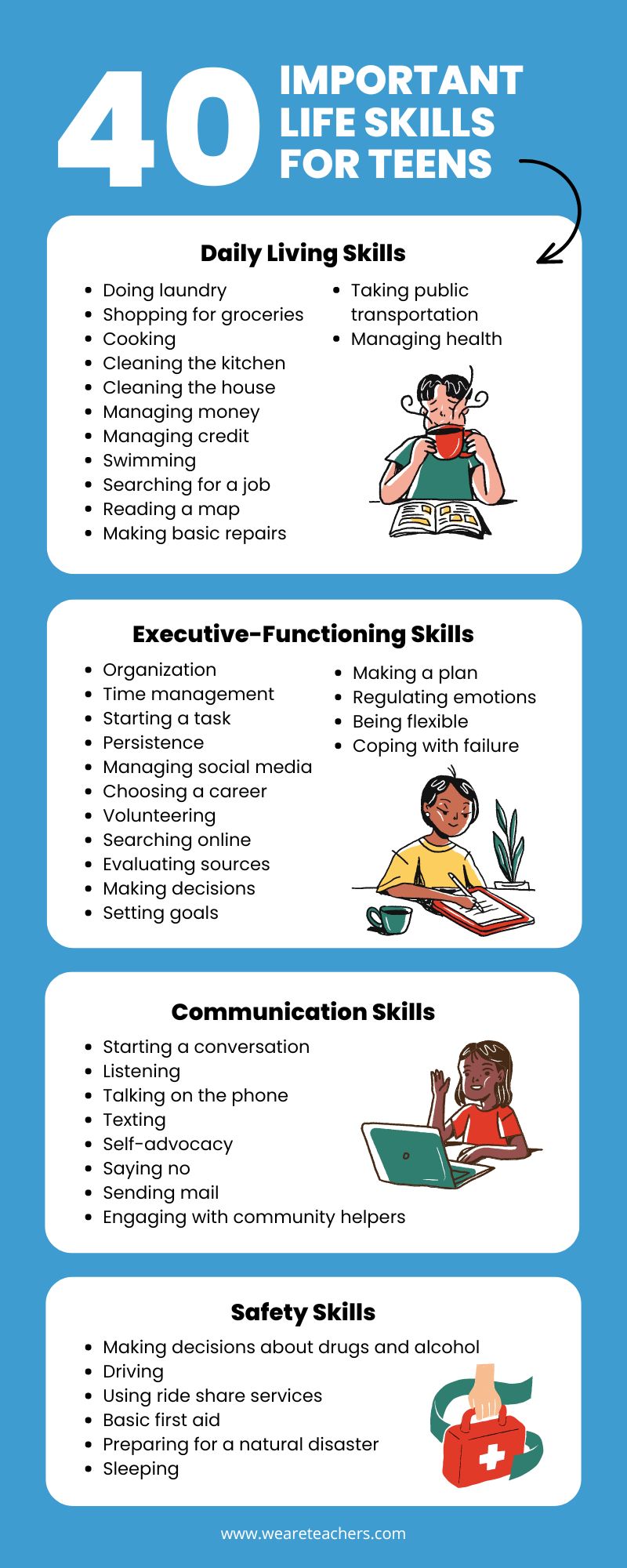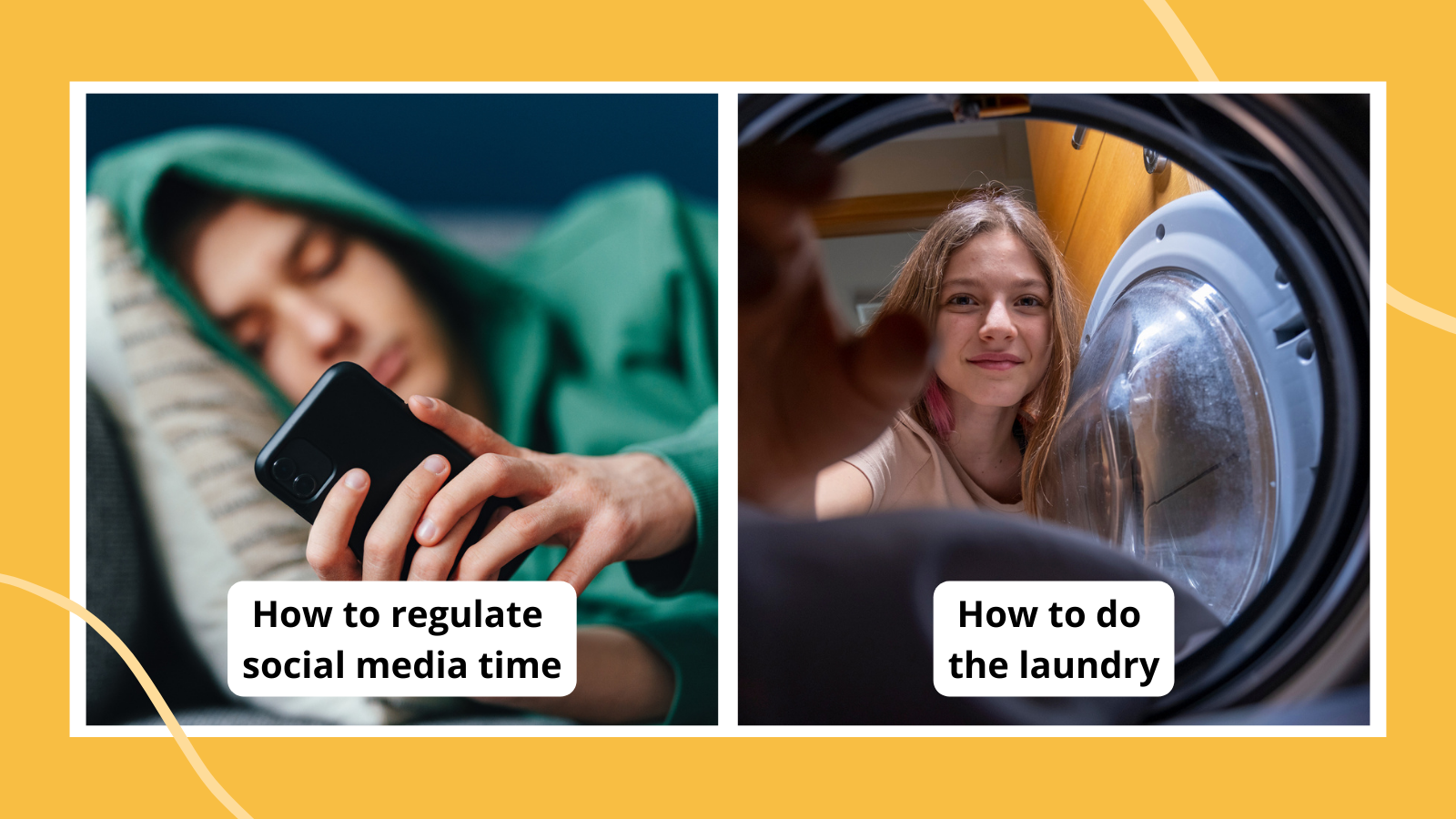Teens should leave home and head to college or career with a sense of who they are and the life skills to start adulting. We’ve compiled a list of the top life skills that teens need to be successful in relationships, work, home, and life in general. Adulting is hard, so give teens a running start with these 42 skills.
Daily Living Skills
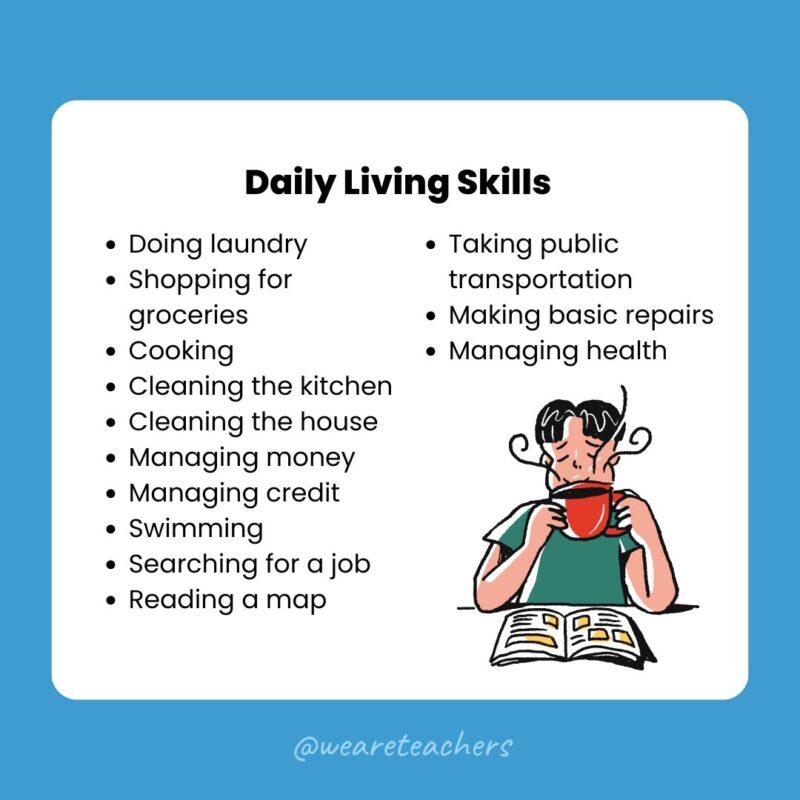
1. Doing laundry
Start with the basics like how to sort colors and read the labels. Discuss why some clothing items should be washed differently. Don’t forget to teach teens how to use a washing machine and dryer. What is each button for and how does the timing work? You’ll want to cover the benefits of air drying and the purposes of detergent, fabric softener, bleach, and stain remover. This is also a good time to reinforce finishing something you start: It’s better to do one load from dirty to folded and put away.
2. Shopping for groceries
The best way to show your children how to grocery-shop is to invite them to go with you. Start with developing a grocery list based on foods they always eat and recipes they want to make. Deepen the learning by discussing the concept of meal plans and nutrition considerations. In the store, discuss how to choose the best fruits and vegetables and how the perimeter aisles of the grocery store are where you should focus your shopping because that’s typically where the fruits, vegetables, meat, and dairy products are.
3. Cooking
Now that your teens know how to get the food into the house, it’s equally important to know what to do with it. Instead of making all the meals yourself, include your teens in meal prep, cooking, and cleanup. Share the cookbooks and online resources you use for recipes and meal ideas. Ask them to find a recipe they’d like to make, and let them loose in the kitchen.
4. Cleaning the kitchen
Once teens have learned how to cook, cleaning the kitchen is the next logical step. It’s about more than cleaning up after yourself: It’s about seeing a task through and making sure their kitchen stays critter-free. Teach your teen how to load and unload the dishwasher, tips for washing dishes, and how to start at the top (counters) and work your way down to the floor.
5. Cleaning the house
After they clean the kitchen, they can move on to the rest of the house, from dusting to vacuuming. Assign chores to different members of the family and rotate so everyone gets a turn. As much as we tell teens why it’s important to keep a clean house, actually doing it themselves will help them understand what’s involved. This will pay off later in life when they live with others or invite people over to their house.
6. Managing money
Money is still an abstract concept for many teens. Teaching budgeting, saving, and managing money now will help them for years to come. Mastering financial literacy skills comes from having an allowance, budgeting for things you want, understanding how credit cards work, and saving money for a school trip or for college. Managing finances is possibly one of the most important life skills for teens to learn. After all, starting off on the right course can help avoid digging yourself out of a deep hole in the future.
Learn more: Financial Literacy Books for Kids and Teens
7. Managing credit
Start small with this skill. Have teens borrow money from you to help them create a plan to pay it back, learn about interest, and stick with the payment plan even when it’s hard. This is a lesson that’s best taught when teens are working with small amounts of money.
8. Swimming
Swimming develops great body awareness, and it expands the ways that teens can have fun safely. This is one of those life skills for teens that is best left to the experts, but it’s important to find the right teacher. Some teens might prefer to be private about learning and some will enjoy a group lesson. For teens who didn’t learn to swim early on, this will also be a lesson in overcoming challenges.
9. Searching for a job
Finding a job is hard for a skilled adult with lots of experience, but for a teen it can feel impossible. Take this one point-by-point, addressing tools for finding a job first. No matter how young a tween or teen is, they can still develop a decent resume. The important thing to remember is not to compare your teens to others you know. Instead, build upon your teens’ strengths. Once you’ve both brainstormed strengths, come up with age-appropriate internships or jobs they can apply for.
10. Reading a map
Yes, GPS is wonderful. But knowing how to use a map helps teens make good decisions when they’re traveling. Start by discussing the different parts of a map and the common symbols you may find. Compare a phone mapping app to a paper one. And when you’re traveling, apply your knowledge of maps and locations to figure out shortcuts or alternate routes.
Learn more: Map Skills and How To Teach Them
11. Taking public transportation
Taking a bus or train with ease literally makes the world available teens. Teach them how to find and read timetables, map routes, and how to buy tickets. Don’t forget to reinforce safety in public spaces and what they should do if they feel unsafe.
12. Making basic repairs
Gather a supply of everyday tools and go through them with your teens. Teach them what each tool is for and how to use it. You might even think about putting together a basic tool kit for them to call their own. Of course, the most fun way to teach kids is to do a project together. Think of a project that would be meaningful for both of you—perhaps a free little library—and instruct as you build together.
13. Managing their health
Staying healthy might not be something that teens are thinking about, but knowing the basics—drinking enough water, wearing sunscreen, getting some activity each day—goes a long way. You can also teach kids how to make their own doctor’s appointments, advocate for themselves at the doctor, and track their health stats (weight, blood pressure, etc.). After all, when it comes to health, patterns learned in childhood set the course for young adults to thrive. True, bad patterns can be overcome, but having a strong, healthy foundation gives kids a head start as they approach adulthood.
Learn more: Reasons To Talk About Underage Drinking Prevention in the Classroom
Executive-Functioning Skills
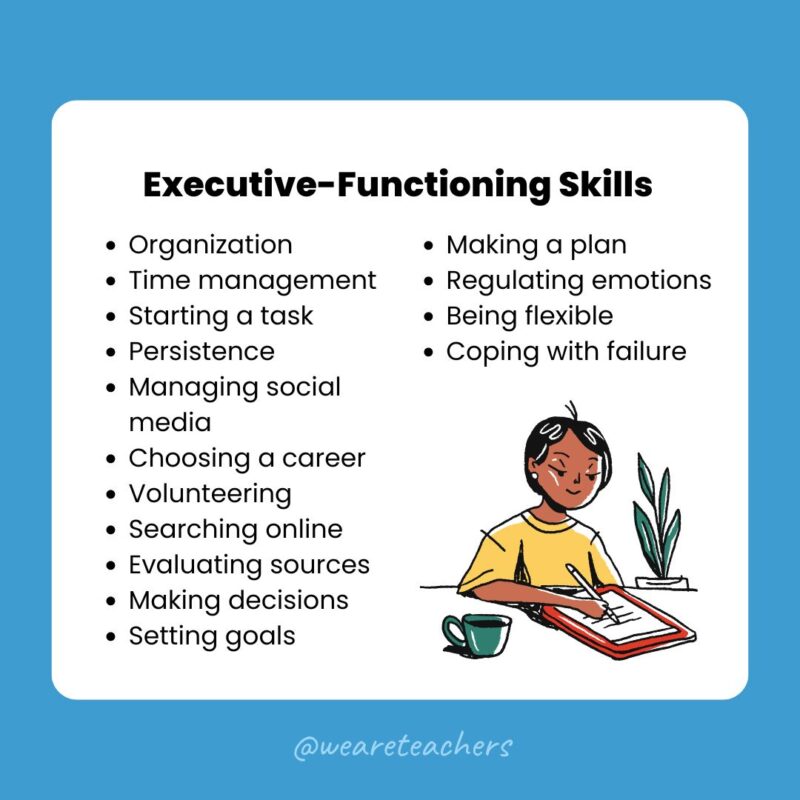
14. Organization
Teens need help when it comes to developing life skills like organization. It’s tempting to organize for them, but teens need time and practice (and more practice) to build organization skills. Show them different ways of organizing things, from their laundry to their to-do list, and let them figure out what works best for them.
Try it: Ultimate Study Skills Guide
15. Time Management
When it comes to college and career, time management is everything. Talk with your teen about what schedule works best for them. What tasks are most important and should be done first? What can wait until later? And how will they organize their time to allow for enough time in the day?
Learn more: Effective Time Management Strategies and Tools for Students
16. Starting a task
The ability to start a task is an underrated skill. Teach teens how to break overwhelming or unpopular tasks into smaller chunks and get started so they can complete all their work and aren’t bogged down with procrastination.
17. Persistence
Once students are able to start tasks, sticking with them, even when they are hard or boring, is another important skill. Breaking large tasks into smaller chunks helps teens complete multi-step activities. And teach teens how to take breaks so they don’t get too frustrated or overwhelmed.
18. Social media use
Social media can quickly take over a teen’s (or anyone’s) day. Make sure your teen has personal boundaries around social media. Setting and keeping to rules that matter to your teen will help them manage their interactions online in healthy ways.
Learn more: Best Books About Social Media
Try it: Guide to Digital Stress and Social Media Addiction
19. Choosing a career
Help teens learn the important life skills of knowing themselves and how they want to spend their time. Talk with them about what makes them excited. Making decisions? Leading a team? Working with math? Writing? Once they have a good feel for who they are, they can start exploring careers that use those skills and involve topics they’re interested in.
Try it: “Would You Rather” Questions To Get Teens Thinking About Future Careers and Surveys That Can Jump-Start Conversations About Careers
20. Volunteering
Teaching teens to give back is teaching them empathy and instilling a value of service. Start by finding a volunteer organization that your teen cares about and finding ways they can contribute.
Try it: Volunteer Projects for Teens and Virtual Volunteer Opportunities
21. Searching online
Teens will be searching for everything from recipes to research. Teach them how to think about what they really want to learn about online so they can draft just the right search terms.
22. Evaluating sources
After they’ve searched online, teens need to know how to evaluate the information they find. Knowing how search engines deliver information, which sources are reputable, and what to do if you find unreliable sources online are all vital skills for today’s teens.
23. Making decisions
Teens are entering a time of life when they start to make decisions daily, from who to spend time with to what extracurriculars to invest time in to when to go to bed. Help students define each decision, the stakes (high or low), the options, and which option is best for them.
24. Setting goals
Knowing what they want is sometimes half the battle. Help teens set a clear goal they can focus on and that is achievable for them, whether that’s making the swim team, earning a scholarship, or getting into a college they love.
25. Making a plan
And when they have their goal, teach teens how to create a plan with manageable steps to help them achieve their goal. The practice of goal-setting and planning is one that they’ll take with them long into adulthood.
26. Regulating emotions
In many ways, if teens can’t regulate their emotions, it doesn’t matter if they can’t set goals or make a plan. Teach teens to talk about their feelings, and how they can respond when they are feeling “high” (giddy, excited, angry) or “low” (sad, lethargic, apathetic). When situations arise, reflect on how your teen handled the scenario and what they can do differently next time.
Learn more: What Is Emotional Regulation?
27. Being flexible
The ability to switch course and change plans is a helpful one as teens navigate friendships and the workplace. Point out when your teen is being flexible, and if they’re not naturally flexible, point out how it’s good for them to change plans or be flexible when necessary.
28. Coping with failure
Failure is hard for anyone, but failure leads to success. And when teens can reflect and learn from failure, they’ll come out on top. Teach healthy self-talk. Praise your teen’s effort instead of their achievement. Talk about failure and be a model for dealing with it. Share your own failures.
Communication Skills
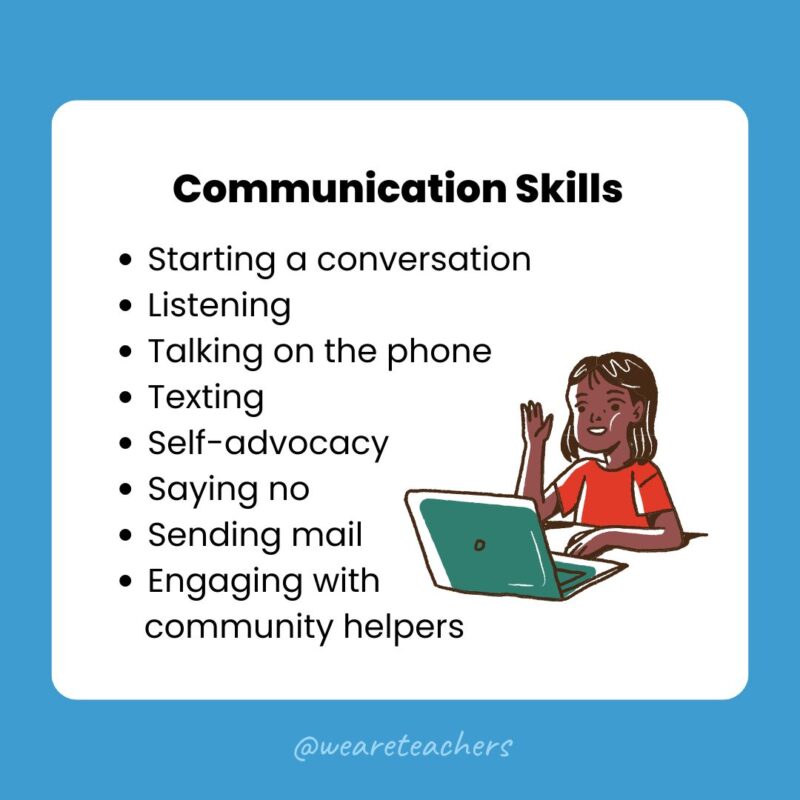
29. Starting a conversation
Teens need to know life skills like how to start a conversation with someone new, as well as how to initiate conversation with someone they have known for a long time. Model this by engaging in small talk, use icebreakers to add some structure, or if your teen needs more structure, give them some ideas (introduce yourself, start with a compliment, ask a relevant question).
30. Listening
Once they’re talking, teens also have to listen. Active listening (looking at the speaker, nodding and smiling, asking questions) is a helpful skill to practice.
31. Talking on the phone
It seems old-fashioned now, but being able to answer a phone call and politely taking or declining the call is something that will serve teens well.
32. Texting
Sending texts may be their preferred method of communication, but teens do need to know the dos and don’ts of texting. Create a set of rules about texting, with a focus on how to respond to annoying or inappropriate texts. When should a teen bring a text to an adult or friend for advice? How long should they wait before responding to a text that makes them mad? And at what point should they respond with a phone call?
33. Self-advocacy
Self-advocacy or standing up for themselves means knowing their personal values and boundaries, and speaking up clearly when someone has crossed their boundaries. Writing their list of values is a good starting point. And talking through open-ended scenarios to discuss how they would handle each helps teens develop advocacy skills.
34. Saying no
There are times when a teen will have to say no to something. Knowing how to say no in a firm, kind way and when to walk away from a situation are skills that could literally save a teen’s life.
35. Sending mail
Yes, teens should know how to send “snail” mail. Even if it’s sending packages to Grandma, knowing how to organize mail, address an envelope, and where to go if they need to send a larger package is a skill they’ll use more than they think.
36. Interacting with community helpers
At some point, if they haven’t already, teens will interact with the police, firefighters, or other community helpers. Teach your teen the skills they need to have an appropriate interaction with community helpers. And make sure they have a plan to get help if they need it.
Safety Skills
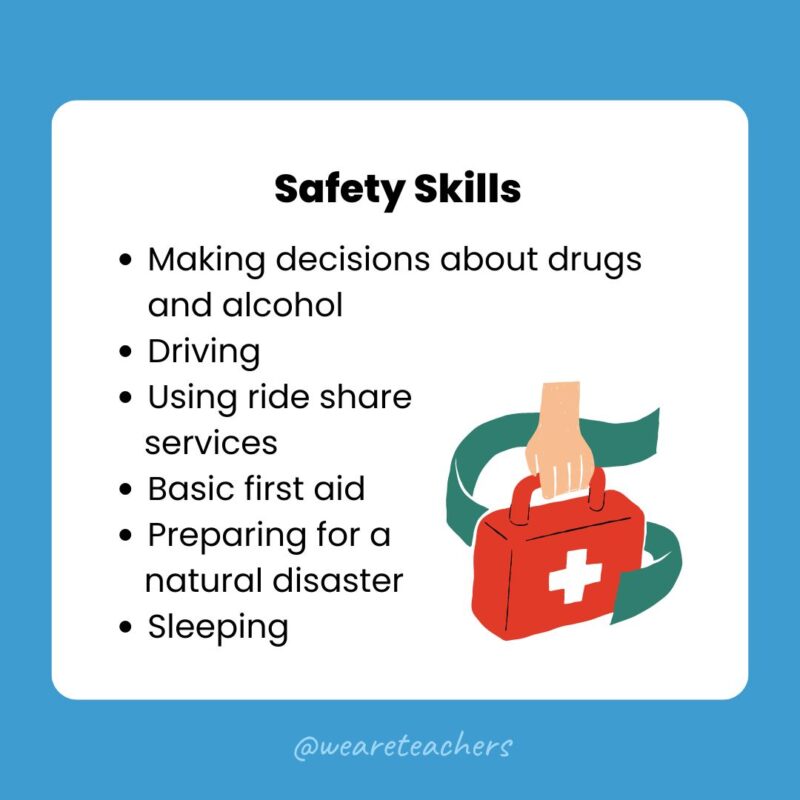
37. Making decisions about drugs and alcohol
Making good choices about drugs and alcohol is one of the most important life skills you can teach teens. When it comes to making decisions about tobacco, alcohol, and drugs, kids and teens need explicit guidance. Smoking, drinking, and drugs are bad ideas, full stop. Teens need to know why, but also how, to handle it if someone offers them drugs or alcohol. Practicing a script at home can give teens the words they need to establish boundaries.
38. Driving
It’s a teen right of passage, but driving is risky business. Invest in a driving course and spend lots of time practicing in parking lots and on back roads so teens can develop the core driving skills. And model safe driving when you’re in the car with your teen. Point out what you’re doing when you slow down at a round-about or come across a surprise animal on the road so your teen can learn.
39. Using ride-share services
Ride-share services are a great way for teens to get around, but they should know how these services work and how to be safe. Read the rider safety tips for the app you download onto your teen’s phone, and encourage them to always let you or someone else know where they are going.
40. Basic first aid
Knowing how to respond to even small incidents can make teens feel empowered to help others. Enroll in a first aid course, teach your teen what you know about first aid, and let them be the first aid responder for the family. If someone needs a bandage or gets too hot, how can your teen help?
41. Preparing for a natural disaster
This skill isn’t about prepping months of food—teens should know where to look for weather and disaster news and updates for their area. They need to know how to manage time before a weather event comes through, when to leave or when to stay put, and who to contact for help if they need it. In addition to involving them in your own disaster preparedness, have them download important apps onto their phone and coach them through their first snowstorm or hurricane as an almost-adult.
42. Sleeping
Teens have so much going on it’s not unusual for them to skip sleep. Setting an age-appropriate sleep schedule and sticking to it will help them maintain their health and safety in every sense. Teen sleep is an issue, so help your teen create a schedule that lets them get enough sleep and complete all the things they need to do each day.
What would you add to our list of life skills for teens? Come share in the We Are Teachers HELPLINE group on Facebook.
Plus, Meet Teens Who Are Changing the World.
